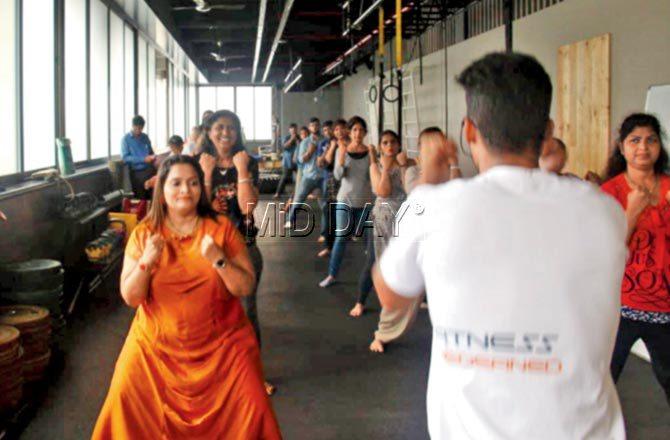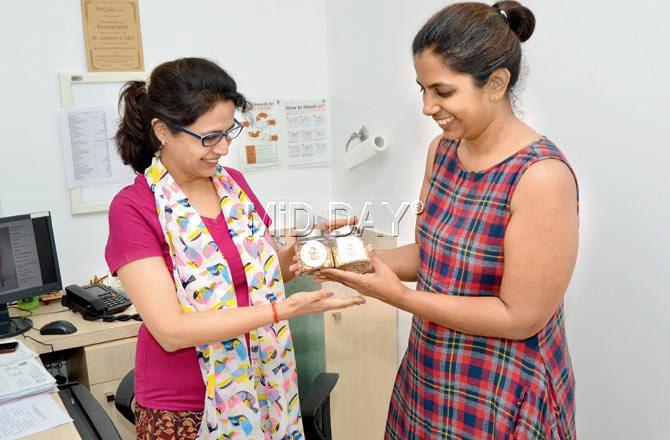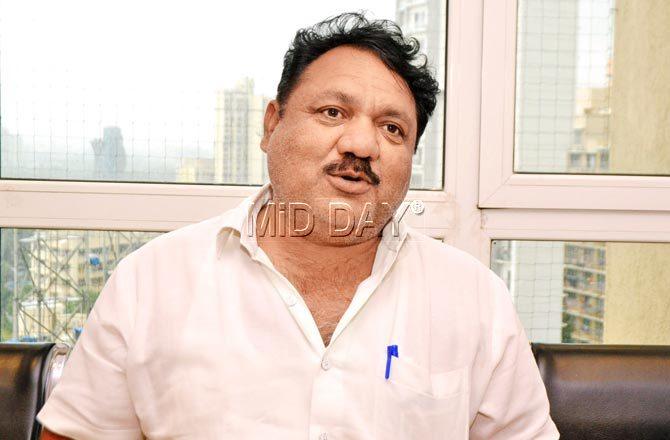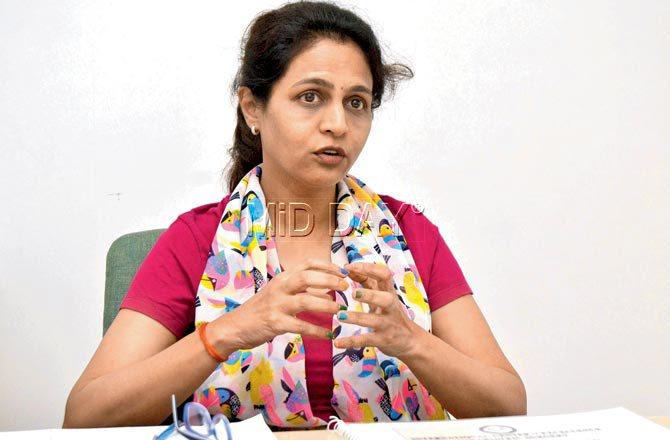In a country where body shaming is rampant, obesity support groups provide a sanctuary for those looking for a way out

Patients at Dr Todkar's support group practise breathing techniques. Pics/Datta Kumbhar
Rajesh Ghoge, a resident of Sinnar, Nashik, didn't know what an obesity support group was until he inadvertently landed up at one while paying a visit to Hiranandani Powai Hospital to meet Dr Jayashree Todkar, Asia's first woman laparoscopic and bariatric surgeon. "It was reassuring to see many like me. Up until then, I was so used to being the only fat person in a group," he says. There, he met some who were battling obesity, while others who have been there and are now on the road to recovery. "I come from a family of farmers, so, physical labour is routine. But no amount of gruelling farming could bring my weight down," he says.
ADVERTISEMENT
The jolly 41-year-old who once weighed 150 kg, has managed to bring it down to 120 kg. But then he hit a plateau. Till date, Ghoge has tried yoga, cycling, dieting and even attended Baba Ramdev's weight loss camp. "I knocked off 10 kg there because I survived on fresh fruits and water. My family was thrilled to see that I'd lost some weight. Once home, I gained it all back," he says.

The #HumFitTohIndiaFit challenge organised by Dr Motwani
Tired of the yo yo effect, Ghoge took a train to Mumbai to find out about bariatric surgery. While Ghoge, whose BMI is above 35, is mulling bariatric surgery, not all patients may require one, says Dr Todkar, who has also helped Maharashtra Chief Minister Devendra Fadnavis knock off 18 kg in three months. And that's when obesity and bariatric support groups come to the rescue, helping patients get social support and one-on-one individual and group coaching. According to a study by the Malnutrition Mapping Project by the Global Alliance for Improved Nutrition (GAIN) in partnership with Amway, India has the third-highest number of obese and overweight people
after US and China.
A shared reality
What makes matters worse is the prevalent culture of body shaming, where all kinds of insults and advice are thrown at those who do not fit in the societal standards of a perfect body. "I've faced it since childhood where I was ridiculed and judged for my appearance. Honestly, if there's anything that comes second to cancer in terms of suffering, it's obesity. There's so much stigma attached to it that nobody wants to even talk about it. In cancer, people are sympathetic towards you, but here they are repulsed by you," Ghoge says. He says the situation is worse in rural areas where the problem is hardly addressed. "There are others like me, feeling as miserable." The World Health Organisation (WHO) defines overweight and obesity as abnormal or excessive fat accumulation that presents a risk to health. A person with a BMI equal to or more than 25 is considered overweight.

Homechef Sharon Solomon (right) who once weighed over 100 kg says her weight loss inspired her to explore organic food
Dr Todkar, who has been running Evolve, a bariatric support group since 2003, says when patients join the group, they are already battling subtle depression, low self esteem, and troubled relationships. "So when they join a group, they realise there's a shared reality where experiences are similar. Therefore, they can help each other. And, we as professionals, are here to provide the additional support," she says. She says obesity is a highly underdiagnosed disease.
"Most people are unaware that they are also fighting hypertension, diabetes and cardiovascular diseases that are an offshoot of it," she says. Home chef Sharon Solomon, who once weighed 110 kg, and has now lost close to 40 kg through a bariatric surgery, says obesity changed how she viewed food. "I wasn't losing weight because I was insulin resistant. I'm also a foodie and so I wanted to eat tasty food. So in that phase, I had started questioning everything I was eating," she says. Today, Solomon shuttles between two support groups, Pinkathon and Evolve, and has developed a keen interest in organic food. "Every time I create a new vegan recipe, I check with the doctor and share it with the support group," she says.

Rajesh Ghoge
Dr Todkar's support group meetings are usually held in the hospital premises once a month. Patients keep in touch through WhatsApp, emails and calls. Support groups usually have a theme at every meet. The theme could be entered around healthy diet, lifestyle modification, exercise tips, yoga sessions and so on. Two months ago, Dr Todkar organised a play where every person represented an organ and the script revolved around how obesity affects the body. The sessions are also in tune with current trends. Dr Manish Motwani, a bariatric surgeon in Mulund West who has been running an obesity support group for the last 12 years, recently held a #HumFitTohIndiaFit challenge with his group. "It was attended by over 100 people, and these are individuals who at one point would find it difficult to walk, let alone exercise," he says.
Let's talk weight
In February, entrepreneur Navin Pareek launched Slim.in, a group-based weight loss intervention where a group, typically eight to 12 people, meet once a week for an hour. The session is facilitated by a psychologist. They recently conducted a free two-hour seminar on how to read and interpret nutrition labels. For example, Pareek says very few people know that a diet cereal brand contains more salt than chips.

Dr Jayashree Todkar
The 41-year-old, a former director of technology and finance at MEND, an obesity prevention and treatment programme for children and young in the UK, says in the West, where obesity has been a challenge for much longer, weight loss groups are the norm. "In fact, in a small country like the UK, over 19,000 meetings run every week," he says. For now, Pareek has been visiting housing societies that have clubhouses in them and holding sessions raising awareness about the subject. "It's difficult to get people to sign up because weight loss is so overdone that the people glaze over it. What we are trying to do is help people realise that there's a scientific way to go about it," he says.
The methodology for changing behaviour has been gleaned from successful smoking sessions and drug rehabilitation programmes. "We analyse the psychological aspects also from the words we use. For instance, a lot of people with weight issues use words like 'I must' and 'I should'. We call them imperatives. So when you use these words a lot, you tend to invariably break them and feel guilty about it," he says.
You aren't alone
Sowjanya Indukuri, a US-based psychologist working in the field of mental health, says support groups are accountable. "If you are dieting or exercising alone, you are accountable for yourself. When it comes to groups, you are accountable. Once you say it, you are out there. You feel more responsible to keep your word," she says. Dr Aparna Govil Bhasker, practising Bariatrics in Mumbai at Apollo Hospital, says it's also common for people to leave support groups. "Ideally, support groups should run life-long. But, yes they do leave. Sometimes people shift out of the city or at times are not able to find time from their busy schedules," she says. Having said that, there's no denying the sustainability that support groups offer. "As Ratan Tata rightly said, if you want to walk fast, walk alone. But if you want to walk far, walk together," says Indukuri.
Catch up on all the latest Mumbai news, crime news, current affairs, and also a complete guide on Mumbai from food to things to do and events across the city here. Also download the new mid-day Android and iOS apps to get latest updates
 Subscribe today by clicking the link and stay updated with the latest news!" Click here!
Subscribe today by clicking the link and stay updated with the latest news!" Click here!






